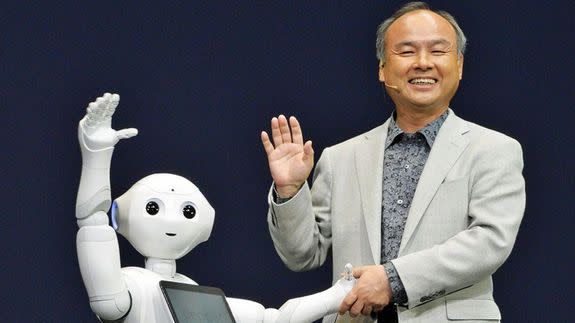Softbank CEO says he must stay on to prepare for the robot revolt

Yesterday, the Japanese business world was rocked when it was announced that would-be successor to Masayoshi Son, Nikesh Arora, would not be taking over the top spot at Softbank and is instead leaving the company.
Arora's tweetstorm about the matter aside, there were many questions about the sudden shift for one of Japan's largest, most high-profile tech companies. On Wednesday, Son removed some of the mystery by blaming the change on the unlikeliest reason imaginable: the Singularity.
SEE ALSO: Why 'Her' Is the Best Movie Ever Made About the Singularity
"I still have unfinished business regarding the Singularity," Son told the Nikkei. "I want to continue for at least another five years."
That's right, "the" Singularity — the one involving intelligent, self-aware computer systems and maybe even robots taking over the planet as humans cower in fear. This is the reason Son is giving the public and investors for sticking around a little longer.
"I think we are about to see the biggest paradigm shift in human history," Son told the Nikkei. "The Singularity is coming. Artificial intelligence will overtake human beings not just in terms of knowledge, but in terms of intelligence. That will happen this century … Looking into the next 30 years, our focus will no doubt be on AI, smart robots and the Internet of Things."
But even if you happen to believe in the Singularity, Son's robot apocalypse math doesn't add up. Leading Singularity theorist Ray Kurzweil (who is actually pretty good at predicting technological developments) forecasts that the Singularity will happen by 2045. So while that fits within Son's "30 years" comment, it doesn't address why he thinks another five years at the helm is necessary to address the coming "robopocalypse."
Nevertheless, Softbank itself has been very aggressive in recent years promoting its Pepper robot, so the news that Son plans to devote more time to making the company competitive in the artificial intelligence space should come as no surprise. But by invoking the specter of the Singularity, Son places himself in the same — some would say too science-fictiony — category as fellow futurist Elon Musk, the founder of SpaceX and Tesla.
However, since both Musk and Son lead major tech companies making real changes to our reality, in the coming years it will only become more difficult to ignore their warnings about what seems to many now as nothing more than the plot to a summer blockbuster movie.
But 30 years will pass faster than many realize, so we'll probably find out in our lifetimes if Son and Musk were right, assuming we're not all already forcibly plugged in to treadmills to provide kinetic energy for our robot overlords.

 Yahoo News
Yahoo News 